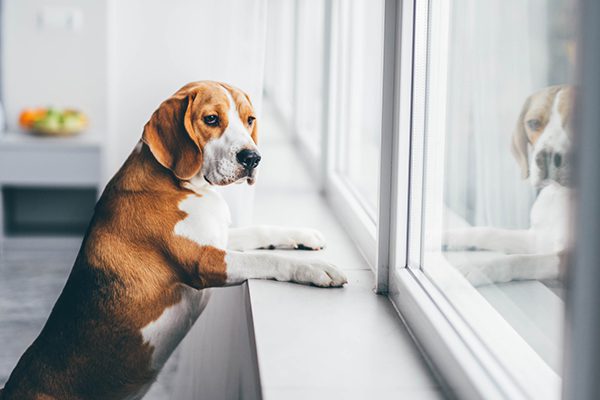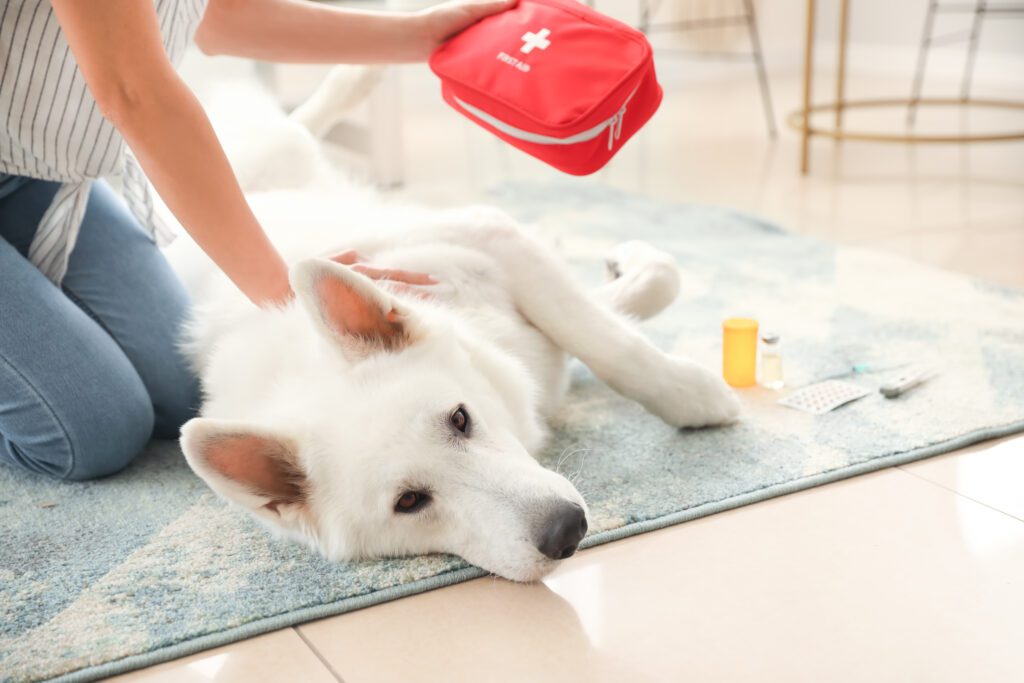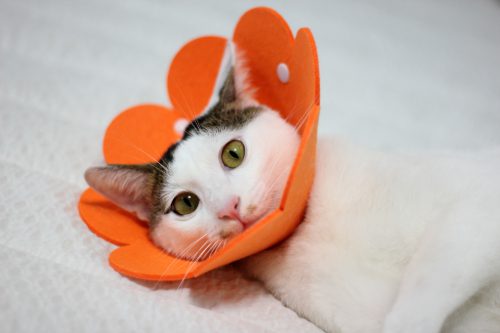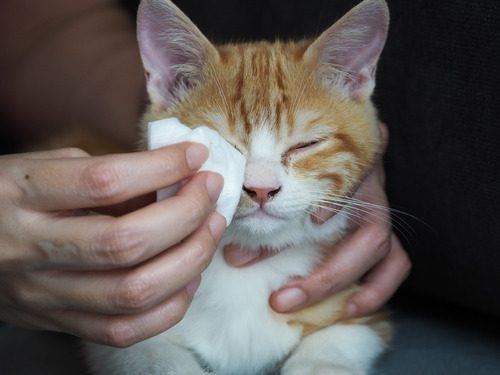Clifton Park Pet Owners: Does My Dog Have Separation Anxiety?
It can be heartbreaking when you leave the house, and your dog is giving you a sad look. It can make you wish you did not have to go. Fortunately, there are ways to help them become more comfortable with being home alone.
The only way to figure out if your pup has separation anxiety is to know the symptoms. If your dog gets upset when you go away from the house, they may have separation anxiety. It can be a process to teach them that being alone sometimes is not scary.

The best way to handle separation anxiety in your dog is to take them out to exercise before you leave and give them toys to occupy their time while you are gone. If you see indications of separation anxiety in your dog, it is best to talk to your vet about different ways you can help.
What Are the Symptoms of Separation Anxiety in Dogs?
If your pup becomes uncomfortable or anxious when you put on your shoes or grab your keys to go out, they may have separation anxiety. You should be mindful that your dog will often display specific behaviors if they have this issue.
Below are some of the symptoms of separation anxiety:
- Barking or howling – Making a fuss as you are getting ready to leave the house
- Destructive behavior – Chewing up furniture or other items
- Peeing or defecating– Eliminating waste inside the house or marking their territory
- Pacing – Walking around in circles or a straight line
- Psychological distress – Elevated heart rate, panting or drooling
- The excitement when you return home – Following you around wherever you go
Always leave your dog with their favorite toys, puzzles, or games. That way, they are occupied while you are gone. It is important to get your canine to focus on something besides their separation anxiety.
Many dogs can be trained, and eventually, they have less anxiety or do not suffer from it anymore. Below is a chart with some items your pup might like to play with while you are gone:
The chart illustrates that there are many choices for finding a fun toy for your pup to keep them occupied. If they learn to associate you being gone with playtime, it may no longer be stressful for them.
| MADE BY | NAME OF TOY | WHERE TO BUY | PRICE |
| Trixie | Activity Flip Board | Chewy | $ 13.99 |
| Moropaky | Heartbeat toy | Amazon | $ 28.99 |
| Jolly Pets | Teaser Ball | Chewy | $ 9.60 – $ 23.49 |
| Star Mark | Bob-A-lot | Amazon | $ 20.79 |
| Paw 5 | Snuffle Mat | Amazon | $ 39.50 |
| Star Mark | Treat Dispenser | Amazon | $ 19.67 |
Which Dog Breeds Tend to Have the Worst Separation Anxiety?
Separation anxiety is not exclusive to certain breeds. However, evidence suggests that some breeds are more prone to having separation anxiety than others. These include:
German Shepherd
The German Shepherd is used to being a social, active dog. They often work with the police, and they have even been used for herding sheep. This breed loves to be wherever the action is. They are loyal and intelligent. Separation anxiety is often seen in this breed.
Australian Shepherd
Herding breeds tend to have a propensity toward separation anxiety, and the Australian Shepherd is no exception. They were made to be working dogs, and they do not like being stagnant and alone. They do not like being away from their humans for long periods.
Labrador Retriever
This dog is a popular family dog and does not like to be left alone. They are loyal and devoted and enjoy time with their humans. They tend to want love and attention, and they become sad when they are not receiving it. Being away from their humans can also make them worried and anxious.
Border Collie
This type of breed is a working and sport dog. They tend to exhibit high energy, and they are very intelligent. They need mental stimulation to preclude them from getting bored or depressed. The depression can become separation anxiety if they are used to their humans taking them to agility and performing other activities.
Cocker Spaniel
This breed likes to spend a lot of quality time with their families. They may become anxious or stressed when their humans leave them alone in the house. Cocker Spaniels tend to be loyal and loving. Their overall temperament makes them prone to separation anxiety.
Bichon Frise
The Bichon Frise is known to have separation anxiety. They are companions and lapdogs who do not like to be away from their families. Bichon Frise are the type of dog that will follow you around all day. They are often outgoing, friendly, and loving. They will likely give you a warm greeting when you get home.
Cavalier King Charles Spaniel
The Cavalier King Charles breed has a reputation for suffering from extreme separation anxiety. They will provide your family with unconditional love and loyalty, and they are lap dogs. They do not like to be left on their own.
German Shorthaired Pointer
This breed is a German gundog who was bred to work alongside their guardians for long periods. They do not do well when separated from their humans. They are nicknames “Velcro dogs” because they will stick to their guardian like glue. They live to please their families.
Can a Dog Suddenly Develop Separation Anxiety?
The Covid-19 pandemic has not only been difficult for humans, but it has also had a significant impact on our pets. It has affected the way that dogs feel about spending time alone.
The annual PDSA Animal Wellbeing report said that 27% of dogs adopted since the pandemic started in March 2020 are showing signs that they cannot stand to be left home alone. Dogs got used to having their humans around when everyone was home and not working.
These pups display clingy behavior and have separation anxiety because they have not been appropriately acclimated to spending time alone. The PDSA also states that even dogs who have been with their families pre-pandemic are acting differently.
These pups tend to get fussy when they are left alone. It just goes to show that dogs need constant socialization, and if your puppy has not been trained to be alone, it can lead to behaviors that signify separation anxiety.
What Are Ways You Can Help with Separation Anxiety?
If you want to help your pup with their separation anxiety, here are some suggestions:
- Exercise your dog about 30 minutes before leaving the house
- Leave the television on or play music
- Only leave your dog alone for four hours at a time
- Train your dog to be alone when you are in the house
- Do not make you leaving the house too dramatic for them
- Toys! Puzzles! Games! Fun!
- Talk to your vet regarding the best way to handle separation anxiety in your dog
You can try any of the above tips to make it easier on your pet when you are gone. Your dog will begin to feel less anxious and afraid.
Overcome Your Dog’s Separation Anxiety with Time and Patience
Understanding separation anxiety in your dog is the first step to knowing how to help them. Certain breeds have a propensity for separation anxiety, and you should watch out for that.
Pet parents would like the best for their fur babies. Helping them with their separation anxiety can go a long way toward having a happy, healthy pup!
Recent Posts
Pet First Aid: Essential Supplies for Your Pet Emergency Kit
Pet First Aid: Essential Supplies for Your Pet Emergency Kit Every pet parent wants to keep their…
Benefits of Spaying or Neutering a Cat
Benefits of Spaying or Neutering a Cat Deciding to spay or neuter your cat is a responsible…
Why Does My Cat Get Eye Boogers Everyday?
Why Does My Cat Get Eye Boogers Everyday? Cats are known for their meticulous grooming habits, but…
About Us
Originally opened as Animal Care Hospital by Dr. Mark Johnston in 1989, the hospital became Cornerstone Veterinary Hospital in 2015 when it was purchased by Drs. Alan and Lisa Knott. The name 'Cornerstone' holds a special place in their hearts, representing not only their Christian faith but also their commitment to being the cornerstone of the community in which they practice. As a family-owned and operated practice, every pet is treated as part of the family, ensuring they receive the highest standard of care. The team at Cornerstone Veterinary Hospital is dedicated to building lasting relationships with clients and their beloved pets, striving to be the cornerstone of the community in which they practice.



